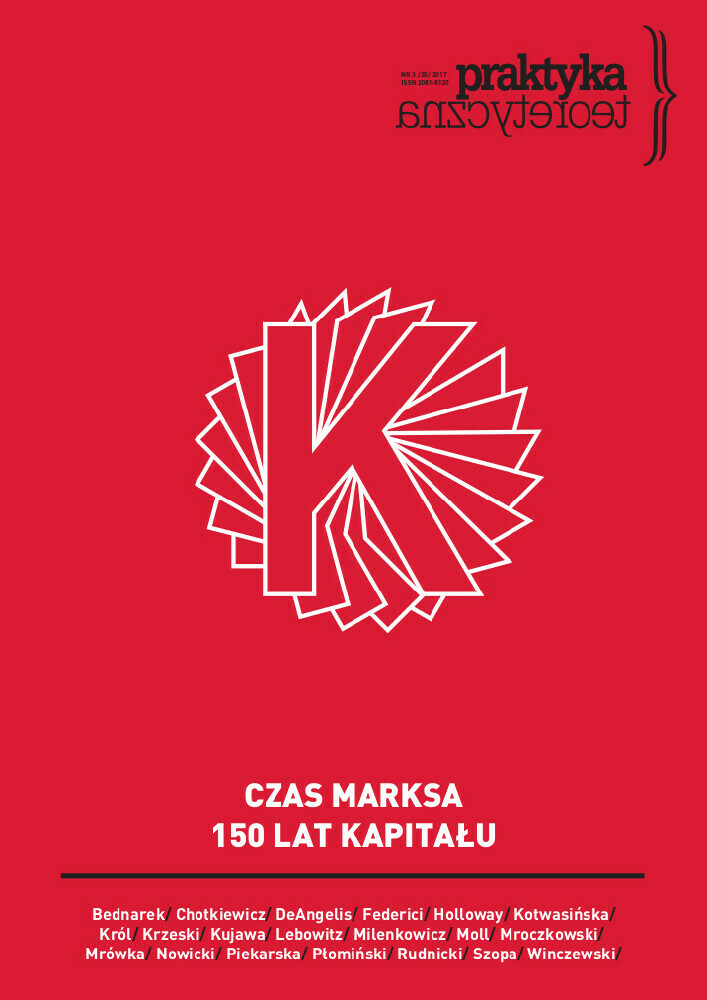Abstract
The article presents a critical reading of traditional psychoanalysis from the perspective introduced by Gilles Deleuze, Fèlix Guattari and Luce Irigaray in their early works. Despite significant differences noticeable within their thought, it is interesting to compare two fundamental books, Anti-Oedipus (1972) and Speculum (1974), in order to emphasize the point of convergence, notably the reformulation of the oedipal triangle through releasing desire from the normative process of oedipalization.References
Araszkiewicz, Agata. 2001. „Czarny ląd czarnego kontynentu. Relacja matka-córka w ujęciu Luce Irigaray”. W Ciało, płeć, literatura. Prace ofiarowane profesorowi Germanowi Ritzowi w pięćdziesiątą rocznicę urodzin. Red. M. Hornung, M. Jędrzejczak, T. Korsak. Warszawa: Wydawnictwo Wiedza Powszechna.
Bednarek, Joanna. 2015. Linie kobiecości. Jak różnica płciowa przekształciła literaturę i filozofię? Warszawa: Wydawnictwo Naukowe PWN.
Braidotti, Rosi. 1994. „Of Bugs and Women: Irigaray and Deleuze on the Becoming-Woman”. W Engaging with Irigaray: Feminist Philosophy and Modern European Thought. Red. C. Burke, N. Schor, M. Whitford. New York: Columbia University Press.
Colebrook, Claire i Weinstein Jami (red). 2008. „Deleuze and Gender”. Deleuze Studies vol. 2. Edinburgh University Press.
Deleuze, Gilles. 2001. „Dualism, Monism and Multiplicities (Desire-Pleasure-Jouissance)”. Tłum. D.W. Smith. Contretemps nr 2: 92–108.
Deleuze, Gilles. 2007. Negocjacje 1972–1990. Tłum. Michał Herer. Wrocław: Wydawnictwo Naukowe Dolnośląskiej Szkoły Wyższej Edukacji TWP we Wrocławiu.
Deleuze, Gilles i Félix Guattari. 2017. Anty-Edyp: Kapitalizm i schizofrenia. Tłum. Tomasz Kaszubski. Warszawa: Wydawnictwo Krytyki Politycznej.
Freud, Zygmunt. 2009. „Kobiecość”. W Zygmunt Freud. Wykłady ze wstępu do psychoanalizy. Nowy cykl. Tłum. Robert Reszke. Warszawa: Wydawnictwo KR.
Grosz, Elizabeth. 1993. „A Thousand Tiny Sexes: Feminism and Rhizomatics”. Topoi nr 12: 167–179.
Grosz, Elizabeth. 2005. Time Travels. Feminism, Nature, Power. Durham and London: Duke University Press.
Irigaray, Luce. 1985. Speculum of the Other Woman. Tłum. G.C. Gill. Ithaca and New York: Cornell University Press.
Irigaray, Luce. 1993. Je, Tu, Nous: Toward a Culture of Difference. Tłum. A. Martin. New York–London: Routledge.
Irigaray, Luce. 2002. To Speak is Never Neutral. Tłum. G. Schwab. London–New York: Continuum.
Irigaray, Luce. 2010. Ta płeć (jedną) płcią niebędąca. Tłum. Sławomir Królak. Kraków: Wydawnictwo Uniwersytetu Jagiellońskiego.
Irigaray Luce. 2017. To Be Born: Genesis of a New Human Being. Palgrave MacMillan.
Kłosińska, Krystyna. 2010. Feministyczna krytyka literacka. Katowice: Wydawnictwo Uniwersytet Śląski w Katowicach.
Kujawa, Dawid. 2017. „Poza trójkąt rodzinny”. Praktyka Teoretyczna http://www.praktykateoretyczna.pl/dawid-kujawa-poza-trojkat-rodzinny/
Lorraine, Tamsin. 1999. Irigaray and Deleuze: Experiments in Visceral Philosophy. Ithaca and London: Cornell University Press.
Olkowski, Dorothea. 2000. „Body, Knowledge and Becoming-Woman: Morpho-logic in Deleuze and Irigaray”. W Deleuze and Feminist Theory. Red. I. Buchanan, C. Colebrook. Edinburgh: Edinburgh University Press.
Richardson, Janice. 1998. „Jamming the Machines: »Woman« in the Work of Irigaray and Deleuze”. Law and Critique vol. IX, nr 1: 89–115.
Szopa, Katarzyna. 2016. „»Ekonomia łożyska«, czyli Luce Irigaray filozofia spotkania”. W Kobieta, literatura, medycyna. Red. A. Galant, A. Zawiszewska. Szczecin: Wydawnictwo Uniwersytetu Szczecińskiego.
License
“Theoretical Practice” seeks to put into practice the idea of open access to knowledge and broadening the domain of the commons. It serves the development of science, thinking and critical reflection. The journal is published in open-access mode under the CC-BY-NC-SA 4.0 license (detail available here: http://creativecommons.org/licenses/by-nc-sa/4.0/). Articles published in the journal may be freely distributed, stored, printed and utilized for academic and teaching purposes without restrictions.
They should not be, however, used for any commercial purposes or be reconstructed into derivative creations. Access to the journal may not be limited or offered for a fee by any third party.
Prospective authors are obliged to fill in, sign and send back the publishing contract compliant with the CC licencing. [PL.pdf, PL.doc, EN.pdf,EN.doc].
According to this contract, authors grant the journal a non-exclusive right to publish their work under the creative commons license (CC-BY-NC-SA 4.0) without any financial obligation on both sides of the contract.
Before submission authors should make sure that derivative materials they use are not protected by copyright preventing their non-commercial publication. Authors are responsible for any respective copyright violations.
